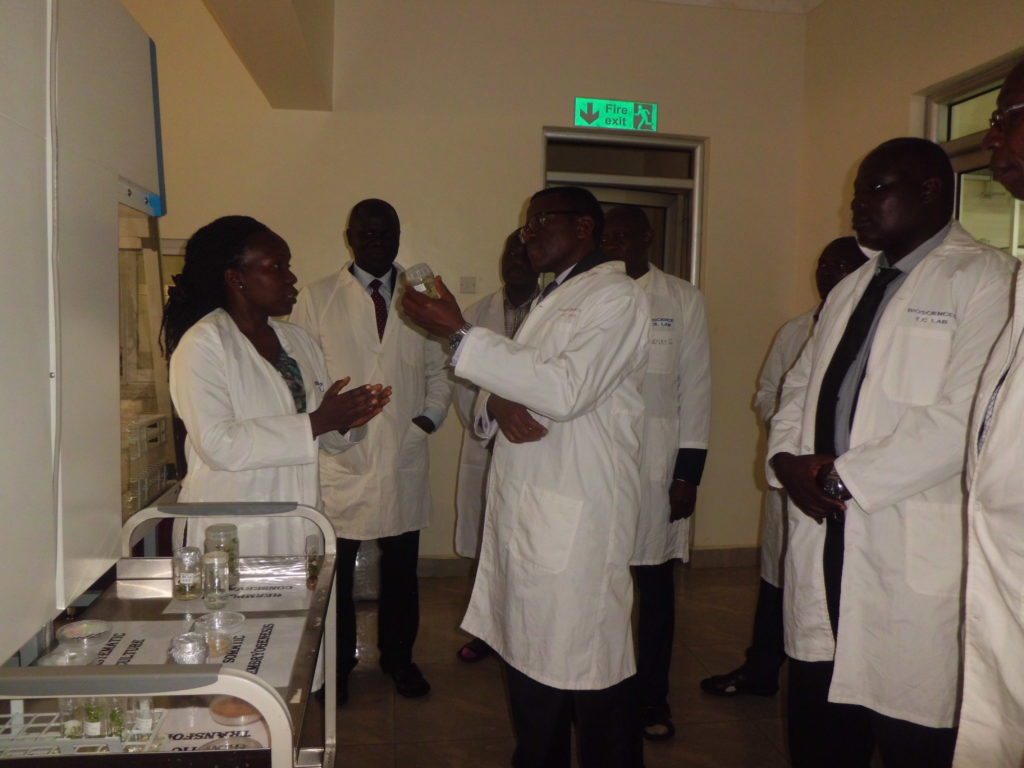The prime minister of Buganda Kingdom, one of Uganda’s influential traditional institutions, praised biotechnology and agricultural innovations after visiting a government research facility in Namulonge yesterday.
Prime Minister Charles Peter Mayiga was fascinated to see products bred using modern biotechnology in the biosciences laboratory at the National Crop Resources Research Institute (NaCCRI) as a team of prominent scientists explained to him the processes of conventional and modern plant breeding.
“I am so amazed by the level of advanced application of science in the laboratories used to breed plants free from pests and diseases,” the prime minister said. “This can increase yields in farmer fields, which we may export to cause change in the country’s economy.”
Dr. Titus Alicai, the head of NaCCRI’s root crops program, explained the basic diagnostic procedure of disease infection in plants using its DNA, which prompted the prime minister to ask, “What is DNA? What does it look like? Is it liquid? Can it be seen with naked eye?”
Alicai replied: “DNA is the carrier of genetic information and it is what makes all living things to be alive. It can be seen under a microscope. For the case of cassava breeding, if farmers are complaining of their plants being infested by unknown disease, what we do is get the tender leaves of the plant, which are ground and cleaned, to enable us study the DNA. This way we shall get to know that the plant is infected with cassava brown streak virus (CBSV). Eventually we are able to use genetic modification to come up with clean planting materials free from CBSV.”

Mayiga was further mesmerized when scientists explained the process of plant breeding using genetic engineering in order to come up with clean planting material using tissue culture.
Hellen Apio explained to him that in the biosciences lab, her team is able to breed cassava by extracting tiny cells from the cassava leaves, which are then grown in media placed in test tubes. Later, the plant is taken to screen houses and finally to the garden.
“We have done this in breeding banana resistant to banana bacterial wilt, coffee resistant to coffee twig borer, maize resistant to maize stalk borer and Irish potatoes resistant to late blight, among others,” she said. “For the case of cassava, we immunize it using CBSV, which is integrated in the cassava cell to fight the virus in the plant, and this way we are able to breed GMO cassava.”
This prompted Mayiga to say, “You scientists are very brilliant people. This science is very good because it is helping in breeding clean planting materials. I hear people opposing GMOs, then why are they doing so?”
While addressing those who received him at the Institute, Mayiga noted that the mission of the Buganda Kingdom is to create socio-economic change, particularly among its subjects in central Uganda, and this can only be done through transforming the agriculture sector.
“The King of the Buganda Kingdom has entrusted me to initiate programs which can change the lives of the people of Buganda and Uganda at large,” he said. “This country cannot compete with countries such as China and Japan in manufacturing vehicles, but we can compete with them in the agricultural sector by embracing technologies which are being used by our scientists.”
By visiting the institute, Mayiga identified several ideas that can be used to educate farmers across the country about how this advanced agricultural technology can help solve the nation’s challenge of food insecurity.
“I have seen the scientists processing cassava starch for making biodegradable bags, and they are processing diesel from used vegetable oil, which can be used by farmers practicing mechanized agriculture,” he noted. “I can tell you if we embrace application of modern technology in the agriculture sector, we can drive our industrial sector effectively.”
Dr. Godfrey Asea, director of NaCCRI, was equally impressed by Mayiga’s visit. Asea viewed it as an eye-opener for the prime minister, who is dealing with people in central Uganda who are major consumers of the East African highland banana. As a leader, he will be in position to disseminate information about the science applied to breed clean planting materials of banana as well as other GMO crops.
“As an institute we have never involved the Buganda Kingdom in the debate about biotechnology, which I think has been an oversight,” Asea said. “It is pertinent that he has come and gone to the laboratories to understand the science applied here. We are going to take this on and engage him further because it is through such leaders that the people get to know that what we breed is not dangerous to society, as portrayed by those who are against genetic engineering.”
Ugandan scientists involved in breeding crops using modern biotechnology application have been hit hard since the president failed to advance the biosafety law, which Parliament passed last October. A number of biotech scientists have lost morale, wondering if the GMO products they’ve developed will ever reach the farmers since there is still no law in place.
But the support of traditional leaders like Mayiga may help to move the legislation forward and encourage acceptance of the technology among the grassroots.
